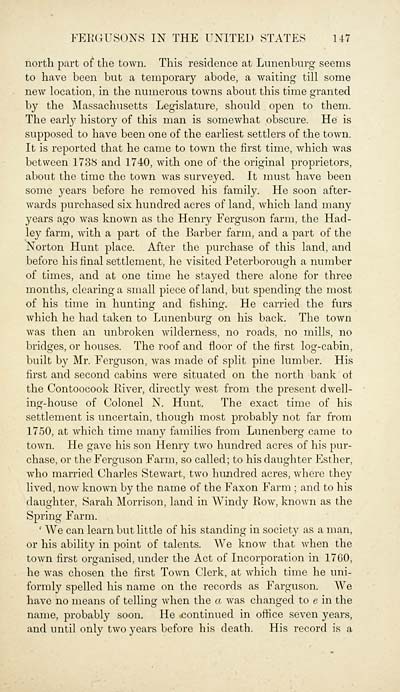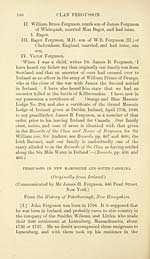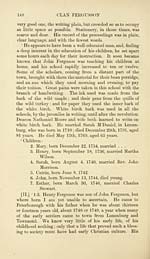Download files
Complete book:
Individual page:
Thumbnail gallery: Grid view | List view

FERGUSONS IN THE UNITED STATES 147
north part of the town. This residence at Lunenburg seems
to have been but a temporary abode, a waiting till some
new location, in the numerous towns about this time granted
by the Massachusetts Legislature, should open to them.
The early history of this man is somewhat obscure. He is
supposed to have been one of the earliest settlers of the town.
It is reported that he came to town the first time, which was
between 1738 and 1740, with one of the original proprietors,
about the time the town was surveyed. It must have been
some years before he removed his family. He soon after-
wards purchased six hundred acres of land, which land many
years ago was known as the Henry Ferguson farm, the Had-
ley farm, with a part of the Barber farm, and a part of the
Norton Hunt place. After the purchase of this land, and
before his final settlement, he visited Peterborough a number
of times, and at one time he stayed there alone for three
months, clearing a small piece of land, but spending the most
of his time in hunting and fishing. He carried the furs
which he had taken to Lunenburg on his back. The town
was then an unbroken wilderness, no roads, no mills, no
bridges, or houses. The roof and floor of the first log-cabin,
built by Mr. Ferguson, was made of split pine lumber. His
first and second cabins were situated on the north bank of
the Contoocook River, directly west from the present dwell-
ing-house of Colonel N. Hunt. The exact time of his
settlement is uncertain, though most probably not far from
1750, at which time many families from Lunenberg came to
town. He gave his son Henry two hundred acres of his pur-
chase, or the Ferguson Farm, so called; to his daughter Esther,
who married Charles Stewart, two hundred acres, where they
lived, now known by the name of the Faxon Farm ; and to his
daughter, Sarah Morrison, land in Windy Row, known as the
Spring Farm.
' We can learn but little of his standing in society as a man,
or his ability in point of talents. We know that when the
town first organised, under the Act of Incorporation in 1760,
he was chosen the first Town Clerk, at which time he uni-
formly spelled his name on the records as Farguson. We
have no means of telling when the a was changed to e in the
name, probably soon. He -continued in office seven years,
and until only two years before his death. His record is a
north part of the town. This residence at Lunenburg seems
to have been but a temporary abode, a waiting till some
new location, in the numerous towns about this time granted
by the Massachusetts Legislature, should open to them.
The early history of this man is somewhat obscure. He is
supposed to have been one of the earliest settlers of the town.
It is reported that he came to town the first time, which was
between 1738 and 1740, with one of the original proprietors,
about the time the town was surveyed. It must have been
some years before he removed his family. He soon after-
wards purchased six hundred acres of land, which land many
years ago was known as the Henry Ferguson farm, the Had-
ley farm, with a part of the Barber farm, and a part of the
Norton Hunt place. After the purchase of this land, and
before his final settlement, he visited Peterborough a number
of times, and at one time he stayed there alone for three
months, clearing a small piece of land, but spending the most
of his time in hunting and fishing. He carried the furs
which he had taken to Lunenburg on his back. The town
was then an unbroken wilderness, no roads, no mills, no
bridges, or houses. The roof and floor of the first log-cabin,
built by Mr. Ferguson, was made of split pine lumber. His
first and second cabins were situated on the north bank of
the Contoocook River, directly west from the present dwell-
ing-house of Colonel N. Hunt. The exact time of his
settlement is uncertain, though most probably not far from
1750, at which time many families from Lunenberg came to
town. He gave his son Henry two hundred acres of his pur-
chase, or the Ferguson Farm, so called; to his daughter Esther,
who married Charles Stewart, two hundred acres, where they
lived, now known by the name of the Faxon Farm ; and to his
daughter, Sarah Morrison, land in Windy Row, known as the
Spring Farm.
' We can learn but little of his standing in society as a man,
or his ability in point of talents. We know that when the
town first organised, under the Act of Incorporation in 1760,
he was chosen the first Town Clerk, at which time he uni-
formly spelled his name on the records as Farguson. We
have no means of telling when the a was changed to e in the
name, probably soon. He -continued in office seven years,
and until only two years before his death. His record is a
Set display mode to:
![]() Universal Viewer |
Universal Viewer | ![]() Mirador |
Large image | Transcription
Mirador |
Large image | Transcription
Images and transcriptions on this page, including medium image downloads, may be used under the Creative Commons Attribution 4.0 International Licence unless otherwise stated. ![]()
| Histories of Scottish families > Records of the clan and name of Fergusson, Ferguson and Fergus. Supplement > (167) Page 147 |
|---|
| Permanent URL | https://digital.nls.uk/95325283 |
|---|
| Description | A selection of almost 400 printed items relating to the history of Scottish families, mostly dating from the 19th and early 20th centuries. Includes memoirs, genealogies and clan histories, with a few produced by emigrant families. The earliest family history goes back to AD 916. |
|---|

